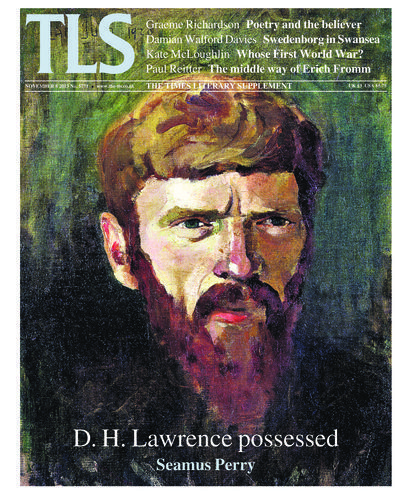In this week’s TLS – a note from the Deputy Editor
In his preface to an American edition of his poems, D. H. Lawrence contrasted the “measured gem-like lyrics” of Shelley and Keats with the kind of poetry he himself wrote and admired: a poetry of “living plasm” with “nothing crystal, permanent”. Seamus Perry reads a new edition of Lawrence’s collected Poems and finds that, though some might wish for less, taking Lawrence the poet all in all is important to seeing “the very odd sort of writer of verse he was”: one whose poetry claims for itself “the unanswerable quality of merely being possessed by the life-forms it celebrates”. Lawrence was briefly associated with Imagism, and it is to that vastly influential movement and its offshoots that we owe what Graeme Richardson identifies as the three “sacred tenets” of modern poetry. And these allow little room for the sacred, or for religious faith – faith such as that professed by Christian Wiman, a poet and until recently the Editor of Poetry (Chicago), who at the age of thirty-nine was found to have a rare and incurable cancer. But according to Richardson “the profound truth” in Wiman’s latest book, a memoir, has less to do with illness or belief than with his “mistrust of writing, his meditative, circling suspicion of his vocation as a poet”. Paul Griffiths, reviewing the new book by the Hungarian László Krasznahorkai, finds that it is about, precisely, “the presence of the infinite, the sacred in human affairs – or its absence”; and that in it Krasznahorkai tells “the same story as always: that we live in a disgraced world”.
From a position which sought to marry psychoanalysis, Martin Buber and sociology, Erich Fromm achieved immense popularity and success with books such as Escape from Freedom and The Art of Loving. He never, though, “achieved his primary political goal of lasting international peace sealed by love”. According to our reviewer Paul Reitter, the wait for a major biography, at least, “is over”. The wait is over, too, for Morrissey’s autobiography – “ornate, windswept, elusive yet never tricksy”, and sometimes delivering vitriol “via a hose”, it will not, says Gwendoline Riley, disappoint his loyal following.
Alan Jenkins
Peter Stothard's Blog
- Peter Stothard's profile
- 30 followers




